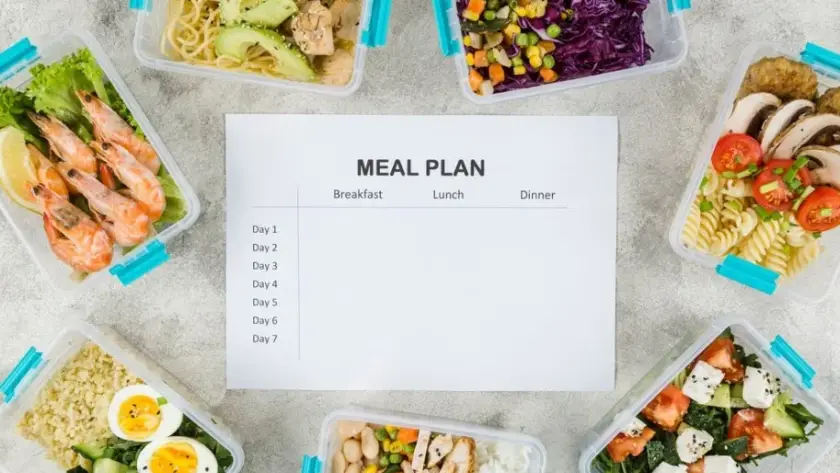Healthy Eating Habits for Fitness Goals
Healthy Eating Habits for Fitness Goals: Long-term fitness achievement necessitates more than merely regular workouts; it calls for healthy eating habits that are sources of body fuel, recovery support, and overall well-being. When we talk about a consistent, balanced nutritional approach, maintenance of energy levels, injury prevention, and achieving optimal health are the main goals. This blog will explore realistic and healthy eating habits to help you reach your long-term fitness goals.
Understanding of Healthy Eating Habits and Food Choices for–
Fitness Goals

Healthy eating habits mean taking care of yourself by making healthy food choices. They focus on eating whole foods that are less processed. These choices are ones you enjoy and can stick with over time without feeling deprived or stressed about them.
Follow these 28 Points to achieve your Fitness Goals
1- Prioritize Whole Foods
Whole foods refer to foods that have not been processed or have undergone little processing. Major examples include fruits, vegetables, whole grains, lean proteins, and healthy fats. We depend on these foods for important nutrients like minerals, vitamins, and trace elements necessary for survival.
2-Fruits and Vegetables

Make sure half your plate consists of different-colored fruits and vegetables, which offer essential vitamins, minerals, and antioxidants needed for immune function and recovery.
3-Whole Grains
When selecting cereals, opt for brown rice, quinoa, oatmeal, or 100% whole wheat bread rather than refined cereals. The greatest value lies in the fiber content present in such grains, which facilitates digestion and provides maximum satisfaction.
Nutritional Counseling for Children and Adults
4-Lean Proteins

Lean proteins, such as chicken, turkey, fish, beans, or lentils, should be included in meals. Protein is required during the repair period after exercises and the growth process.
5-Healthy Fats

Healthy fats, such as avocados, nuts, seeds, and olive oil, should be added to our meals since they help the brain function and regulate hormones.
6-Practice Portion Control
Portion control is crucial for avoiding excess calories and maintaining a healthy body weight. At this point, we will discuss a few valuable tips on practicing portion control so as not to overeat or eat too little.
7-Use Smaller Plates
One way to prevent overeating is by using smaller plates than usual.
8-Listen to Your Body
Pay heed to your signals of hunger and satisfaction. Eat when hungry and stop eating after you are satisfied.
9-Balanced Meals
Each meal should be balanced with protein, carbohydrates, and fat content for fullness and satisfaction.
10-Plan and Prep Your Meals
Among the critical strategies for healthy eating are meal planning and preparation. By planning your meals, you will always have healthy choices and reduce cravings for unhealthy foods.
11-Weekly Planning

Find time every week to plan your meals and snacks. Based on your weekly menu, ensure that you have all the ingredients listed on your shopping list.
12-Batch Cooking
Cook large quantities of food together at one time, which can last up to a week, and then portion them out. This saves time and ensures that you have something nutritious ready to eat in an emergency.
13-Healthy Snacks

Have easily accessible snacks like sliced veggies, fruits, nuts, and yogurt, among others, for easy consumption anytime needed.
14-Stay Hydrated

For overall health, water is crucial, especially fitness-wise, since water aids digestion and helps regulate body temperature, thus facilitating nutrient absorption capacity and enhancing energy maintenance during the workout recovery process. Drink Water: Take 8 cups (64 ounces) or more if active per day.
15-Monitor Water Intake
Keep an eye on the color of your urine. Light yellow indicates you are properly hydrated, while dark yellow may signal dehydration.
16-Hydrating Foods
Add in cucumbers, watermelon, oranges, and strawberries, which contain water.
17-Add Variety of food

Eating a wide array of food provides all the nutrients and keeps you from getting bored with your diet. Additionally, variety supports healthy gut flora required for digestion and overall health and well-being.
Best diet and nutrition program for teens
18-Rotate Foods
Mix up fruits, vegetables, proteins, and grains during mealtime.
19-Try out New Recipes

Experiment with novel recipes or dishes to keep your meals lively and enjoyable.
20-Seasonal Foods
Opt for seasonal and locally grown foods to get fresher options that are rich in nutrients.
21-Conscious Eating
Mindful eating is about being very attentive when eating food and taking pleasure in one’s food. It can lead to a healthier relationship with food instead of overeating.
22-Eat Slowly
Relish each mouthful by chewing slowly while eating it. This will help you know when you have eaten enough, avoiding overeating.
23-Avoid Distractions
Switch off TV sets or smartphones during meals so that they do not disrupt your concentration on the act of eating itself.
24-Enjoy Your Food

Drop all that you are doing for a few minutes, to enjoy taste, feel its texture, or even smell it. This increases the satisfaction and pleasure derived from eating your meal.
25-Maintain Macronutrient Balance
Healthy Eating Habits must achieve a macronutrient balance comprising carbohydrates, proteins, and fats to accomplish long-term fitness goals. Every macronutrient contributes differently to overall body performance, thus promoting general wellness among individuals.
Carbohydrates
They provide the energy needed for daily activities, including workouts. Complex carbohydrates like whole grains, some fruits, and vegetables should be prioritized as they digest slowly.
Proteins
Critical components necessary for repairing muscles and muscle growth should be mixed up while on a diet.
Fats
Healthy fats, such as avocados, nuts, and olive oil, should be considered to support cognitive function and hormonal balance in the body.
26-Reduce Processed Foods and Sugars

Processed foods and sugar can negatively affect your health goals and fitness objectives. They usually contain empty calories, unhealthy fats, and artificial substances.
Read Labels: Check food labels for added sugars and artificial ingredients. If available, choose whole, non-processed foods.
Healthy Alternatives: Replace sugary snacks with more nutritious options like fruits, nuts, or yogurt.
Moderation: Enjoy treats in moderation while keeping your diet balanced.
27-Listen to Your Body
Your body knows what it needs best. Observe how you feel after eating different foods so that you can modify your diet accordingly.
Energy Levels: Watch out for your energy levels under various food intakes as well as meal timings;
Digestion: Pay attention to how certain foods affect your digestion system so that you can know the ones causing discomfort
Cravings: Differentiate between real hunger and cravings. Make informed decisions that align to increase physical strength.
28-Set Realistic Goals

For Healthy Eating Habits and Fitness Goals, it is vital to set realistic goals that are attainable over time. Instead of short-term, unsustainable diets, focus on gradual changes that can be maintained throughout one’s life, thus leading to lifetime success.
SMART Goals: Make sure that they are Specific, Measurable, Achievable within a given time frame, Relevant (fitting well into context), and Time-bound when setting them for your nutrition or physical activity program,
Celebrate Success: Do not forget to take pleasure even from small successes since this will keep boosting your motivation;
Adjust If Required: Be ready for any adjustments based on changes in lifestyle or exercise patterns; otherwise, specific goals might not be achieved.
Conclusion
Healthy eating habits are essential for achieving and maintaining long-term fitness goals. By giving preference to whole foods, portion control, meal planning, prepping, hydration, variety, and mindfulness in eating, you can create a well-rounded, enjoyable approach to nutrition. Balancing macronutrients, minimizing processed foods, being aware of your body’s signals, and setting attainable targets will also help you achieve optimum health and fitness. Remember that the way to success lies through consistency and our choices for our greater good. Start today and reap the benefits of Healthy eating habits for a fitter, healthier future tomorrow.




